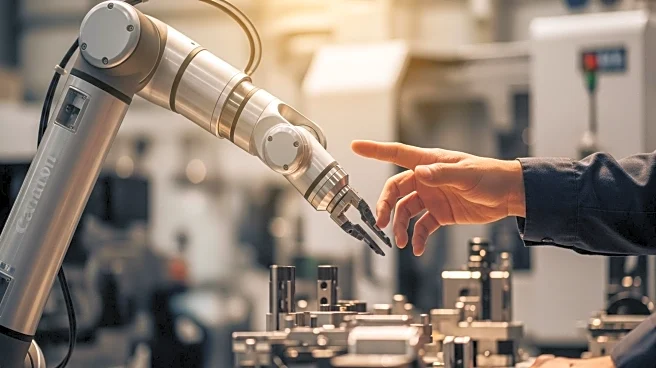What's Happening?
Labor Secretary Lori Chavez-DeRemer has stated that artificial intelligence (AI) will not displace American workers but will instead enhance their roles. In a recent interview, Chavez-DeRemer emphasized that AI is here to stay and will contribute to upward mobility for workers. She highlighted the Trump administration's commitment to making the United States a leader in AI technology. This includes initiatives such as AI literacy and proficiency being declared a national priority, with efforts to integrate AI content into education and workforce training. Despite concerns from corporate executives about potential job losses in white-collar sectors, Chavez-DeRemer remains optimistic, citing examples where AI has helped workers reskill and upskill, leading to higher-paying roles.
Why It's Important?
The integration of AI into the workforce is a significant development with potential impacts on various sectors of the U.S. economy. While some experts warn of job losses, particularly in white-collar fields, the Trump administration's approach aims to mitigate these effects by focusing on education and training. By prioritizing AI literacy, the administration seeks to prepare the workforce for the evolving job market, potentially reducing unemployment and fostering economic growth. This strategy could benefit industries that are able to adapt and integrate AI effectively, while workers who acquire new skills may find opportunities in emerging roles.
What's Next?
The Trump administration plans to continue its aggressive pro-AI agenda, including the rollout of 'America's AI Action Plan.' This plan focuses on tracking AI's impact on the labor market and expanding apprenticeships. The Labor Department has issued guidance for states to use federal funding for AI-skills training, which could lead to more educational programs and workforce development initiatives. As AI technology advances, ongoing monitoring and adaptation will be crucial to ensure that workers are equipped to handle new challenges and opportunities.
Beyond the Headlines
The ethical and cultural implications of AI integration into the workforce are significant. As AI becomes more prevalent, questions about privacy, data security, and the role of human oversight in automated processes will arise. Additionally, the shift towards AI-driven roles may alter workplace dynamics and require new approaches to management and collaboration. Long-term, the success of AI integration will depend on balancing technological advancement with human-centric policies that prioritize worker welfare and societal benefits.











